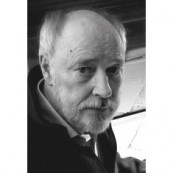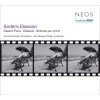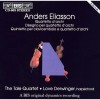Composers
Anders Eliasson
| Country: | Sweden |
| Period: | Contemporary classical music |
Anders Erik Birger Eliasson (born in Borlänge 3 April 1947;[1] died in Stockholm 20 May 2013[2]) was a Swedish composer.
His "earliest musical experiences originated from within myself: they were my own singing, and familiar tunes I heard on the radio. No classical music." Marching his toy soldiers up and down, he used to imagine sounds, learning only later to describe them as an orchestra. Aged 9, he began the trumpet, started up a small jazz orchestra (two clarinets, trombone, rhythm section, guitar, trumpet), and aged 10 he was writing arrangements. A jazz bass-player, "an unbelievable musician", taught him chords. Aged 14, he went to an organist, Uno Sandén, to learn harmony and counterpoint.[3]
Aged 16 he went for private study in Stockholm to "the wonderful Valdemar Söderholm", who "confronted me once more with real music" – music such as he had first heard aged about 12. "The first real piece of music" which Eliasson heard "on a gramophone record was Haydn’s Symphony No. 104."[4]
Under Söderholm, he studied counterpoint: there followed five years’ intensive work on Palestrina, Orlando di Lasso and above all Johann Sebastian Bach,[5] "the highest form of energy with which it’s possible to come into contact."[6]
From 1966 he was a student under Ingvar Lidholm at the Royal Swedish Academy of Music, and until 1973 a member of the artistic committee of the Electronic Music Foundation, Stockholm. His first major successes were a choral work, Canto del vagabondo (1979), and his First Symphony (1989), for whose "originality, authenticity and musical clarity" Eliasson was awarded the Nordic Council Music Prize.
In 1991 he was composer in residence at the Lapland Festival in Arjeplog and visiting professor at Sibelius Academy Helsinki in the academic year 1993/94. 37 works of Eliasson´s were performed at the "1996 International Composer´s Festival Stockholm".[7]
Since 2000 Eliasson has had performed a monodrama for soprano and 27 instrumentalists (Karolinas sömn / Karolina´s Sleep, premiered in 2012), a great number of chamber music as well as five large-scale concertos: a Concerto for Trombone and Orchestra (written for Christian Lindberg), a Concerto for Alto Saxophone and String Orchestra (for John-Edward Kelly, the dedicatee of Eliasson´s 3rd Symphony), a Double Concerto for Violin, Piano and Orchestra (for Roland Pöntinen and Ulf Wallin), a Double Concerto for Violin, Viola and Chamber Orchestra as well as a Concerto for Violin and Orchestra (Solitary Journey, original title in German, Einsame Fahrt).
Together with the composers Kalevi Aho, who was chairman of the jury, and Magnus Lindberg, Anders Eliasson was juror in the 2nd International Uuno Klami Composer Competition 2008/09.[8]
Since 2005 until his death, Anders Eliasson had been composer-in-residence of the New York based Arcos Chamber Ensemble.
Recently Added
| Country: | Sweden |
| Period: | Contemporary classical music |
Biography
Anders Erik Birger Eliasson (born in Borlänge 3 April 1947;[1] died in Stockholm 20 May 2013[2]) was a Swedish composer.
His "earliest musical experiences originated from within myself: they were my own singing, and familiar tunes I heard on the radio. No classical music." Marching his toy soldiers up and down, he used to imagine sounds, learning only later to describe them as an orchestra. Aged 9, he began the trumpet, started up a small jazz orchestra (two clarinets, trombone, rhythm section, guitar, trumpet), and aged 10 he was writing arrangements. A jazz bass-player, "an unbelievable musician", taught him chords. Aged 14, he went to an organist, Uno Sandén, to learn harmony and counterpoint.[3]
Aged 16 he went for private study in Stockholm to "the wonderful Valdemar Söderholm", who "confronted me once more with real music" – music such as he had first heard aged about 12. "The first real piece of music" which Eliasson heard "on a gramophone record was Haydn’s Symphony No. 104."[4]
Under Söderholm, he studied counterpoint: there followed five years’ intensive work on Palestrina, Orlando di Lasso and above all Johann Sebastian Bach,[5] "the highest form of energy with which it’s possible to come into contact."[6]
From 1966 he was a student under Ingvar Lidholm at the Royal Swedish Academy of Music, and until 1973 a member of the artistic committee of the Electronic Music Foundation, Stockholm. His first major successes were a choral work, Canto del vagabondo (1979), and his First Symphony (1989), for whose "originality, authenticity and musical clarity" Eliasson was awarded the Nordic Council Music Prize.
In 1991 he was composer in residence at the Lapland Festival in Arjeplog and visiting professor at Sibelius Academy Helsinki in the academic year 1993/94. 37 works of Eliasson´s were performed at the "1996 International Composer´s Festival Stockholm".[7]
Since 2000 Eliasson has had performed a monodrama for soprano and 27 instrumentalists (Karolinas sömn / Karolina´s Sleep, premiered in 2012), a great number of chamber music as well as five large-scale concertos: a Concerto for Trombone and Orchestra (written for Christian Lindberg), a Concerto for Alto Saxophone and String Orchestra (for John-Edward Kelly, the dedicatee of Eliasson´s 3rd Symphony), a Double Concerto for Violin, Piano and Orchestra (for Roland Pöntinen and Ulf Wallin), a Double Concerto for Violin, Viola and Chamber Orchestra as well as a Concerto for Violin and Orchestra (Solitary Journey, original title in German, Einsame Fahrt).
Together with the composers Kalevi Aho, who was chairman of the jury, and Magnus Lindberg, Anders Eliasson was juror in the 2nd International Uuno Klami Composer Competition 2008/09.[8]
Since 2005 until his death, Anders Eliasson had been composer-in-residence of the New York based Arcos Chamber Ensemble.




